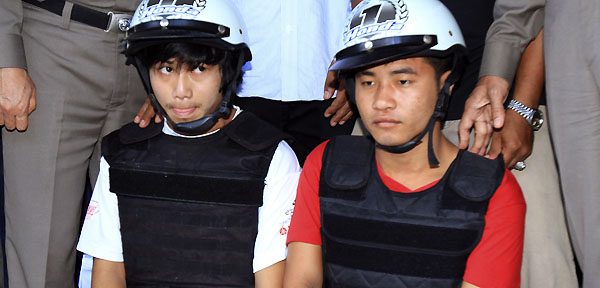The trial of Myanmar citizens Zaw Lin and Wai Phyo (also known as Win Zaw Lin) for the murder of United Kingdom citizens David Miller and Hannah Witheridge opened this week in Thailand to keen scrutiny by stakeholders. The prosecution in particular is hoping for a robust trial devoid of the controversy that plagued the investigation leading to the seven charges brought against the defendants, which in addition to murder include rape and theft. The defendants have pleaded not guilty to all charges.
This plea was unsurprising given the disputations surrounding the investigation. A large police response was initially marshalled after the discovery of the victims’ bodies at a Koh Tao beach on 15 September 2014. The Bangkok Post reported that within days over fifty marine police officers arrived on Koh Tao, targeting fishing boats and ferries operating near the island and migrants working in the area. Before Zaw Lin and Wai Phyo were formally identified as suspects there were already reports of police brutality against other Burmese workers.
More reports of discriminatory violence led up to the arrest of Zaw Lin and Wai Phyo in October. Thai police claimed strong evidence for the arrests including the discovery of a victim’s mobile phone in one of the accused’s home, direct DNA evidence linking them to the crime scene and even confessions. The suspects subsequently claimed they confessed under torture.
Rights groups became involved, highlighting further police abuse of witnesses. Forensic specialists criticised police process in the case, the United Kingdom sent its own investigators to the island and Amnesty International called for an impartial enquiry. The case attracted more media attention when family of the accused met with lawyers and denounced publically the Thai police’s activities. Thailand’s Human Rights Commission also initiated an independent probe into the case but continue to struggle to gain the cooperation of Thai police.
Zaw Lin and Wai Phyo were eventually formally indicted on 4 December and their trial commenced 8 December. If the accused are found guilty then the millions of Burmese workers providing vital, cheap labour for the Thai economy will be further stigmatised in their adopted country. If the accused are found to be not guilty, they will walk away heroic underdogs, bolstering the sense of discrimination and injustice felt by Burmese residents of Thailand. Then the real investigation will need to begin.
Thai Prime Minister General Prayuth Chan-ocha weighed in publically early in the case before Thai police had identified their Burmese suspects, stating that migrants were most likely responsible. He also provided an unsettling justification for the rape and murder:
“I ask, can you get away with wearing bikinis in Thailand? Unless you are not beautiful?”
He later apologised.
Whatever the outcome of the trial, it is highly unlikely that National Police Chief Somyot Pumpunmuang or Police Major General Suwat Jaengyodsuk, the two with overall responsibility for the blighted Koh Tao investigation, will follow with their own apologies.
The Koh Tao investigation is yet another example of institutional discrimination against the Burmese underclass in Thailand, who live on half the minimum wage. Such discrimination is practically government policy. The outcome and integrity of the trial will prove just how far this discrimination reaches in post-coup Thailand, 2015.
Luke Corbin is an independent researcher and graduate of the College of Asia and the Pacific and the Asia-Pacific College of Diplomacy who blogs at http://www.lukecorbin.org/
 Facebook
Facebook  Twitter
Twitter  Soundcloud
Soundcloud  Youtube
Youtube  Rss
Rss 